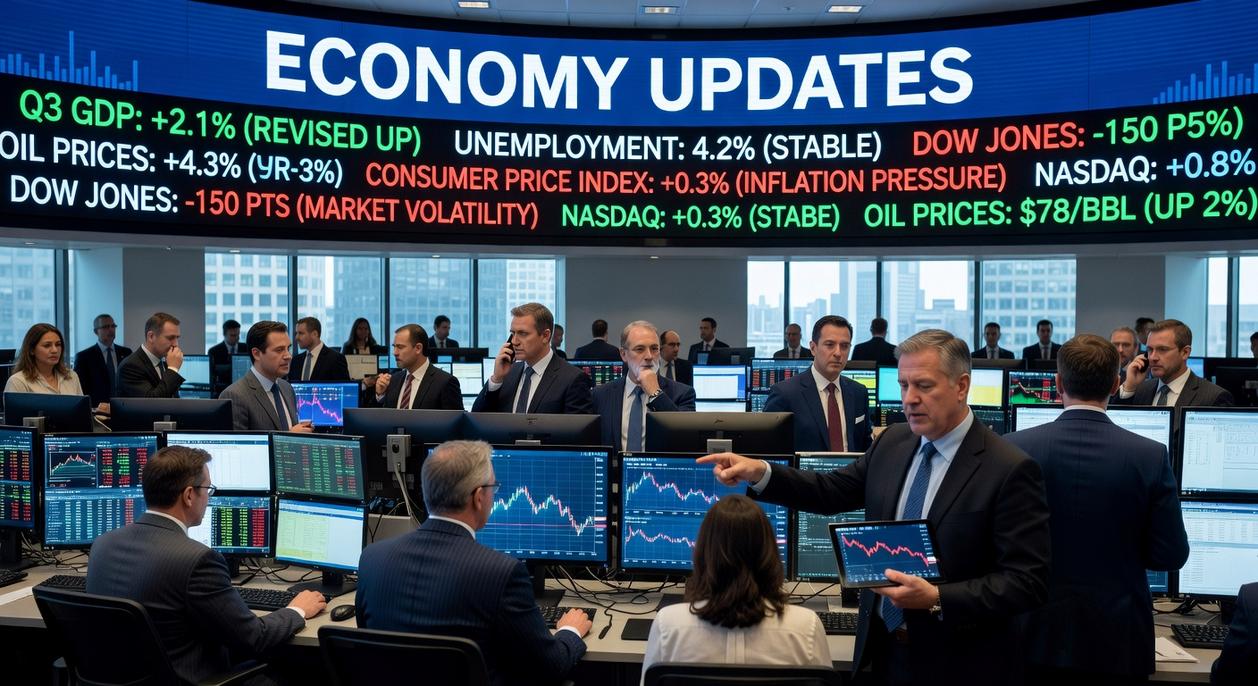I’ve been tracking the economy for years and right now feels different.
You’re getting hit with conflicting messages everywhere you look. Inflation is cooling but prices are still high. The job market is strong but layoffs keep making headlines. Stocks rally one week and tank the next.
It’s exhausting trying to figure out what’s actually happening.
That’s why I put together this economy updates discapitalied. I wanted to cut through all the noise and show you what the data is really saying.
I’m not going to give you predictions or tell you what might happen in six months. I’m going to show you what’s happening right now in capital markets and what the numbers actually mean.
We analyze market movements and macroeconomic indicators every day. This isn’t based on opinions or hot takes. It’s based on real data from real markets.
You’ll walk away knowing where the economy stands today. More importantly, you’ll understand what that means for your money and your financial decisions.
No jargon. No fluff. Just the information you need to make sense of what’s going on.
The Macro Tug-of-War: Decoding the Battle Between Inflation and Growth
You know what’s fun?
Absolutely nothing about reading Federal Reserve statements at 2pm on a Wednesday.
But here we are.
The thing is, inflation and growth are locked in this weird dance right now. And if you’re trying to figure out where to put your money, you need to understand who’s leading.
Some folks say inflation is dead. They point to the headline numbers dropping and declare victory. Pack it up, crisis over, let’s all go home.
Except that’s not what the data actually shows.
The Real Inflation Story
The Consumer Price Index looks better than it did last year. I’ll give you that. But drill into the numbers and you’ll see something different.
Core inflation (that’s the stuff without food and energy) is still running hot. Services costs? Still climbing. Housing? Don’t even get me started.
The Producer Price Index tells a similar story. Sure, goods are cheaper. But services on the producer side are sticky as hell.
It’s like declaring your house clean because you shoved everything into the closet. Looks good until someone opens the door.
What the Fed Is Actually Saying
Here’s where it gets interesting.
The Federal Reserve keeps using words like “data dependent” and “higher for longer.” Most people hear that and tune out. Too much jargon.
But there’s a BIG difference between a pause and a pivot. A pause means they’re taking a breather. A pivot means they’re changing direction entirely.
Right now? We’re in pause territory. Maybe. The economy updates discapitalied tracks show the Fed is basically saying “we’ll see” in the fanciest language possible.
What does that mean for you? Borrowing costs stay high. Your savings account finally pays something. And investment returns get complicated.
The Growth Question Nobody Wants to Answer
GDP numbers look okay on paper. Not great, not terrible. Just okay.
But the leading economic indicators? Those are flashing yellow. Not red yet, but definitely not green.
The soft landing everyone keeps talking about requires PERFECT execution. The Fed needs to slow things down just enough to kill inflation without killing growth.
It’s like trying to parallel park a semi truck. In the dark. While texting. (Don’t actually text and drive.)
Is it possible? Sure. Is it likely? That’s the trillion dollar question.
Recessionary risks haven’t gone away. They’re just sitting there in the corner, waiting to see what happens next.
Sector Spotlight: Where Capital is Flowing (and Fleeing)
You can almost feel the shift happening.
Walk into any investment conference right now and you’ll hear the same conversations. The whispers about which sectors are bleeding capital. The excited chatter about where the smart money is piling in.
I’ve been watching these patterns closely. And what I’m seeing isn’t what most people expect.
Technology’s Great Recalibration
Tech isn’t one thing anymore.
Some people say the entire sector is overvalued and due for a crash. They point to the dot-com bubble and warn that history repeats itself. Fair point.
But here’s what they’re missing.
AI companies are pulling in funding like nothing I’ve seen before. We’re talking billions flowing into anything with machine learning capabilities. The money is loud and relentless. You can hear it in every earnings call and see it in every quarterly report.
Meanwhile, other tech segments? They’re facing a profitability crunch that feels like a slow squeeze. SaaS companies that were darlings two years ago are now scrambling to prove they can actually make money.
The divergence is sharp. Almost painful to watch if you’re on the wrong side of it.
The New Energy Landscape
Energy markets right now taste like uncertainty.
Oil and gas prices swing wildly based on whatever geopolitical tension hits the news that week. One day you’re up. Next day you’re wondering what happened.
But renewable infrastructure? That’s a different story.
The growth is steady. Almost boring compared to the volatility elsewhere. Solar projects, wind farms, battery storage. The discapitalied finance updates by disquantified show consistent capital deployment quarter after quarter.
It’s not flashy. But it’s real.
The Rise of Defensive Plays
When markets get shaky, you can see capital retreat to safety.
Healthcare stocks. Consumer staples. Utilities. These sectors feel solid under your feet when everything else is shifting sand.
Some investors say defensive plays are for people who are scared. That you’re leaving returns on the table by playing it safe.
Maybe. But I’ve also watched those same aggressive investors get crushed when markets turn.
Non-cyclical sectors aren’t exciting. They won’t double your money in six months. But they also won’t keep you up at night wondering if you’re about to lose everything.
The performance data backs this up. During the last three downturns, these sectors held steady while growth stocks dropped 30% or more.
That’s not fear. That’s just math.
The Consumer Pulse: What Spending and Confidence Tell Us

You want to know where the economy’s headed?
Look at what people are actually doing with their money.
I track household balance sheets every month. Not because I love spreadsheets (though I kind of do). But because real wage growth tells you if people can keep spending or if they’re about to pull back hard.
Here’s what the numbers show right now.
Wages are up. But so is everything else. When you adjust for inflation, most households are barely treading water. Personal savings rates have dropped to levels we haven’t seen since 2008 (Federal Reserve data, Q4 2023). And consumer debt? It’s climbing fast.
Some people say this doesn’t matter. They argue that as long as unemployment stays low, consumers will keep spending. That debt is manageable because interest rates will come down soon.
I’m not so sure.
When I look at the retail sales data, I see something interesting. People are cutting back on goods. New furniture, electronics, clothes. Those numbers are flat or falling. But they’re still spending on experiences. Restaurants, travel, concerts.
This shift from goods to services isn’t new. But the speed matters.
It tells you which sectors are about to feel pain and which ones still have room to run. If you’re invested in retail chains, you need to pay attention. If you’re looking at hospitality stocks, the picture looks different.
Consumer confidence surveys give you the clearest signal. These aren’t perfect (nothing is). But when people say they’re worried about the next six months, they usually stop making big purchases. No new cars. No home renovations. No major appliances.
The latest readings from the Conference Board show confidence sitting below historical averages. Not terrible. But not great either.
What does this mean for you?
If you’re tracking economy news discapitalied, you already know that consumer spending drives about 70% of U.S. economic activity. When households pull back, everything else follows.
I’m watching three things closely: credit card delinquency rates (they’re ticking up), the savings rate (it needs to stabilize), and big-ticket purchase intentions (they’re weak).
You don’t need to panic. But you do need to adjust your expectations about which companies will perform well over the next year.
Global Headwinds: International Factors Impacting the Domestic Economy
Ever notice how a factory shutdown in Taiwan can mess with your car purchase in Boston?
That’s the world we live in now.
Supply chains used to run on what they called just-in-time delivery. Companies kept minimal inventory and ordered exactly what they needed when they needed it. Worked great until it didn’t.
Then COVID hit. And suddenly everyone realized how fragile the whole system was.
Now we’re seeing a massive shift to just-in-case inventory management. Companies are stockpiling more. They’re moving production closer to home (that’s near-shoring) or to countries they trust more (friend-shoring).
Sounds smart, right?
Well, it comes with a cost. Manufacturing expenses are going up. Products cost more to make when you’re not chasing the absolute cheapest labor anymore.
But here’s what’s really shaking things up right now.
Europe is still wrestling with energy prices that would make your eyes water. Natural gas costs there remain way above historical norms. That hits their manufacturing sector hard and ripples through to global demand.
Then there’s China. Their post-COVID recovery has been bumpy at best. Consumer spending hasn’t bounced back like many expected. Property markets are still struggling. And that matters because China drives a huge chunk of global commodity demand.
When Chinese factories slow down, shipping rates change. Commodity prices shift. The economy updates discapitalied tracks show these patterns affecting everything from copper to corn.
So what does this mean for us here at home?
Your investment portfolio feels these pressures whether you’re watching international markets or not. A slowdown in European manufacturing means less demand for American exports. Weak Chinese consumer spending affects companies in the S&P 500 that count on Asian growth.
You can’t control what happens in Shanghai or Frankfurt. But you can understand how those distant events work their way into your returns.
Your Next Move: Turning Economic Insight into Action
We’ve covered the core economic trends that matter right now.
The inflation-growth dynamic isn’t going away. Sector rotations are reshaping where money flows. Consumer health remains mixed. And global pressures keep adding uncertainty to the mix.
I get it. This environment feels complicated because it is.
You need clarity when everything feels murky. You need to focus on what actually moves the needle instead of getting lost in the noise.
Here’s the thing: understanding these developments puts you ahead of most people. You can make informed decisions about your investments, your business, or your personal finances.
The data is there. The patterns are visible if you know where to look.
Economy updates discapitalied gives you the tools to see what’s coming. You don’t have to guess anymore.
Now it’s time to act on what you know.
Review your financial plan with fresh eyes. Stress-test your portfolio against these trends. Look for gaps where you’re exposed and opportunities where you’re not.
Position yourself for what’s next. The months ahead will reward preparation and punish complacency.
You came here for insight. Now you have it. Your next move determines whether that insight becomes results.



